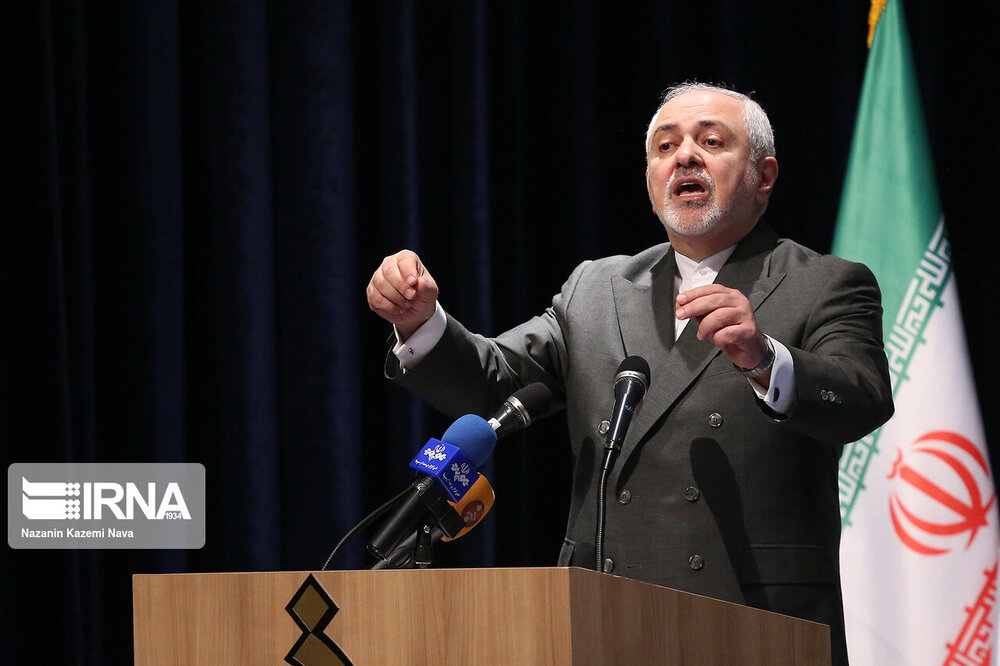Economic war has targeted people’s health, Zarif laments

TEHRAN - Foreign Minister Mohammad Javad Zarif said on Wednesday that the United States’ sanctions and economic war on Iran have targeted the ordinary people’s health and livelihood.
During a speech at an international conference on global economy and sanctions held at Alzahra University in Tehran, the foreign minister said that the United States has turned “economy and dollar” into tools of warfare.
“There was a time when such warfare was used to simply limit the activities of some countries. However, new warfare of the United States and what Trump has called the ‘economic war’ have targeted the ordinary people’s livelihood and health,” the chief diplomat lamented.
He said the U.S. is abusing its economic power and dollar as a tool to exert pressure against other countries.
Zarif said on September 5 that the U.S. economic terrorism against countries including Iran, Cuba, Russia, China, and Syria targets civilians.
“#US #EconomicTerrorism against Cuba, China, Russia, Syria, Iran &... deliberately target civilians, trying to achieve illegitimate political objectives through intimidation of innocent people. US rouge behavior now includes piracy, bribery & blackmail
We salute Cuba & stand w/it,” he tweeted.
In an interview with CNN aired on September 24, Zarif said that sanctions are war.
“Sanctions are war. Because in a war, usually military targets are chosen. In sanctions, civilians are the targets. So, it’s war. It’s more than war,” he said.
During a speech at the 42nd session of the UN Human Rights Council in September, Esmaeil Baghaei Hamaneh, Tehran’s ambassador and permanent representative to the UN office in Geneva, called the consequences of unilateral sanctions against Iran “crime against humanity”.
He urged the United Nations to take action in stopping the sanctions.
President Hassan Rouhani said in June that the U.S. sanctions are examples of “crime against humanity and economic terrorism” because they have targeted ordinary people’s “lives and needs”.
“It should not be said that the U.S. has imposed sanctions on us because they are not sanctions. They are a crime against humanity. They could be called sanctions if they targeted some of our sensitive industries, but they are a crime against humanity and economic terrorism when they target the people’s lives and needs,” he stated.
Trump withdrew Washington from the 2015 nuclear deal, known as the JCPOA, in May 2018 and restored the previous sanctions against Iran and ordered new ones. Trump has described his government’s sanctions against Iran as “economic war”.
‘Using the word sanction for U.S. moves has no legal base’
Zarif also said that using the word “sanction” for the U.S. actions has no legal base.
“Sanction is a legal word which means using a tool to take legal action. If an action is legal, legal tools can be used to carry it out. The United States’ actions are not just to execute the law, but are to violate the law. In Iran’s case, the United States has violated the JCPOA and also the 2231 resolution of the Security Council. So, the United States’ action is intrinsically illegal,” stated Zarif, a professor of international law.
The JCPOA was turned into international law as the UN Security Council adopted resolution 2231 in July 2015 endorsing the agreement.
‘Sanctioning CBI is illegal’
Zarif also pointed to the U.S. action in imposing sanctions on the Central Bank of Iran (CBI), described it as illegal.
He said that the sanctions on the CBI will prevent it from providing food and medicine, adding the action can only be described as “economic terrorism”.
Trump said in September that he has ordered sanctions on Iran’s central bank at “the highest level.” Trump, who had initially imposed the sanctions applied to the central bank, said the new penalties on Iran mark the “highest sanctions ever imposed on a country.”
‘Traditional view cannot work in current situation’
Zarif also said that there are complications in decision making in the international arena and “traditional view” cannot work in the current situation.
He said that the Iranian Foreign Ministry is making efforts to find ways to do international economic interaction without being affected by the United States.
“Removal of the dollar in foreign interaction and use of national currency in interaction with countries are examples of this issue,” he explained.
Elsewhere, Zarif said that Iran should avoid unnecessary tension with neighbors in order to be able to counter Washington’s policy of “maximum pressure”.
NA/PA
